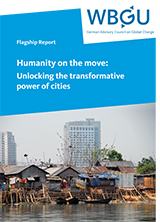- DE |
- EN
Humanity on the move: Unlocking the transformative power of cities
2016 - The momentum of urbanization and its impacts are so massive that we must face up to this trend.
Author:
Frauke Kraas, Claus Leggewie, Peter Lemke, Ellen Matthies, Dirk Messner, Nebojsa Nakicenovic, Hans Joachim Schellnhuber, Sabine Schlacke, Uwe Schneidewind et al.
Publisher:
German Advisory Council on Global Change (WBGU)
Description:

In view of the existing cognitive, technical, economic and institutional path dependencies, a policy of business as usual – i.e. an unstructured, quasi-automatic urbanization – would lead to a non-sustainable ‘world cities society’. Only if cities and urban societies are sufficiently empowered can they make use of the opportunities for sustainability and successfully follow the urban transformation pathways. The success or failure of the Great Transformation will be decided in the cities. The WBGU discusses the relevant conditions for the success of this transformation in this report.
"Sustainable urbanization has become internationally established as a field of action for policy-makers. The topic is currently attracting a lot of attention because of the United Nations Conference on Housing and Sustainable Urban Development (Habitat III), prepared by the UN Human Settlements Programme (UN-Habitat), which is to be held in October 2016.
The WBGU report looks at urbanization in the 21st century and its effects on human civilization, the diversity of the cities, the quality of life of the people, and the Earth system. The WBGU proposes a normative compass that could give orientation to urbanization in the coming decades. It also develops ideas on a polycentric urban development that tries to avoid, on the one hand, the disadvantages of a galloping densification of cities and difficult-to-govern megacities, and, on the other, the high social, environmental and cultural costs of a split between emptying rural spaces and growing, often overburdened urban agglomerations."
Categories:
Language:
English
Page count:
48
Copyright:
German Advisory Council on Global Change (WBGU)
Latest publications
Together for a cleaner city: improvements in waste management
2025 - The partnership between Dabola (Guinea) and Dortmund (Germany)
Action planning for sustainability reporting
2025 - Documentation of the Connective Cities dialogue event from 2 to 4 December 2024 in Berlin




